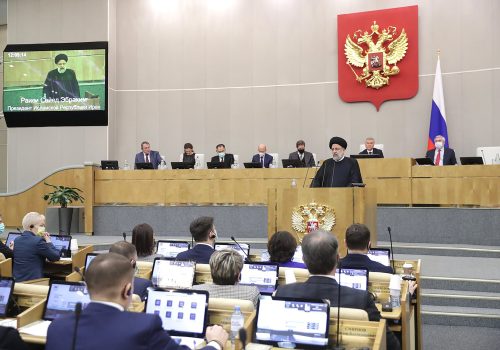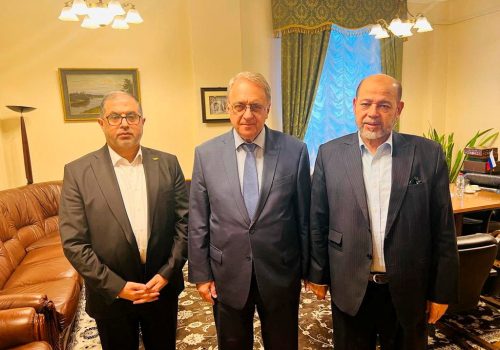Russian-Iranian military cooperation: How much can they depend on each other?
Last February, Reuters reported that Iran had exported about four hundred Fateh-110 ballistic missiles to Russia—a more lethal weapons system than the slow-moving armed drones that Tehran has been shipping to Moscow for use in its war against Ukraine. On August 9, though, Reuters reported that unnamed “European intelligence sources” said that “no transfer had happened at all.” Further, Ukraine had not publicly reported finding any Iranian missile remnants or debris.
The Reuters article also quoted European intelligence sources as stating that “dozens” of Russian military personnel were being trained in Iran on Fath-360 short-range ballistic missiles, which are said to have a maximum range of 120 kilometers (75 miles). These intelligence sources also stated that delivery of these Iranian Fath-360s is expected “soon.” According to one source, the Fath-360 is based on the Fateh-100 design but is considerably smaller, and its launcher can be camouflaged as a civilian truck.
In addition, former Russian Defense Minister and current Secretary of the Russian Security Council Sergei Shoigu was in Tehran on August 5, where he met with several officials, including Iran’s new president, Masoud Pezeshkian. During their meeting, Pezeshkian reportedly told Shoigu that Iran was “determined to expand relations” with its “strategic partner Russia.” Various media sources indicate that Tehran has renewed its requests for Russian deliveries of advanced air-defense systems and that Moscow might have delivered radars, Iskander missiles, and other items, but these have not been verified.
SIGN UP FOR THIS WEEK IN THE MIDEAST NEWSLETTER
The reports come at a time when Moscow and Tehran have experienced embarrassing setbacks. Israeli forces killed Fuad Shukr, a top Hezbollah commander in Lebanon—something Israel has admitted. Hamas political leader Ismail Haniyeh was then killed in Tehran, for which Israel has not claimed responsibility but which it is widely believed to have been behind. Additionally, Moscow was unable to prevent an armed incursion by Ukrainian forces into a sizeable segment of Russian territory in the vicinity of Kursk near the Russian-Ukrainian border.
While the expansion of Russian-Iranian military cooperation might have already been in the works, these setbacks that Moscow and Tehran have experienced at the hands of US-backed Ukraine and Israel may only serve to increase it. Still, the policies pursued by Russia and Iran are not completely in harmony.
While Tehran has vowed to retaliate against Israel for the killing of Haniyeh in particular, Moscow has called for “all parties”—which presumably includes Iran—to refrain from taking steps that could lead to a wider war in the region.
Further, Tehran cannot be pleased by recent news reports that Russian President Vladimir Putin dropped plans to provide missiles to the Iran-backed Houthis at the request of Saudi Crown Prince Mohammed bin Salman. It is unclear how accurate these reports are, as different intelligence sources on which they are based were not in complete agreement with one another. It was a reminder that even while Moscow’s relations with Iran’s adversary, Israel, may have soured after the October 7, 2023, Hamas attack on the Jewish state, Russia’s ties to Iran’s Sunni Arab adversaries such as Saudi Arabia and the United Arab Emirates (UAE) have not.
According to other reports, the Su-35 fighter aircraft Russia reportedly agreed to send to Iran have still not been delivered. An agreement on a new twenty-year Russian-Iranian cooperation agreement has yet to be finalized—with Russian sources pointing to Tehran as the reason.
Despite their differences, Russian-Iranian military cooperation will likely continue—and increase. But with both now on the back foot, the question is just how useful their cooperation is. Moscow is urging Iranian restraint in responding to Israel over the death of Haniyeh in Tehran not because of any inherent peace-loving nature, but because the Kremlin understands that, with its forces tied down in Ukraine, it is not in a position to do much to protect Iran in a wider conflict with Israel—especially if the Jewish state receives US military support. And it might have occurred to the Islamic Republic’s leaders that Iranian drones and ballistic missiles sent to Russia are no longer available for use against Israel or US forces in the Middle East.
However, while military assistance that Moscow and Tehran receive from one another has not allowed either Russia to prevail against Ukraine or Iran to prevail against Israel and the United States in the Middle East, it allows each to continue prosecuting these conflicts—something which leaders in Russia and Iran are clearly determined to do. Absent being able to somehow bring about an end to either conflict, the United States and its partners in Europe and the Middle East do not appear to have a viable means of forcing or persuading either Moscow or Tehran to reduce their military cooperation.
Mark N. Katz is a nonresident senior fellow at the Atlantic Council and professor emeritus of government and politics at the George Mason University Schar School of Policy and Government.
Further reading
Fri, Mar 29, 2024
No, Putin, the ISIS-K attack in Moscow wasn’t about Ukraine
MENASource By Mark N. Katz
This attack by ISIS-K may have been motivated by several grievances, including retaliation for the Soviet occupation of Afghanistan.
Mon, Mar 7, 2022
As the world shuns Russia over its invasion of Ukraine, Iran strengthens its ties with Moscow
IranSource By Nicole Grajewski
Iran’s support for Russian actions reflects the improvement in bilateral ties, which have grown considerably at the political and military levels over the past decade.
Fri, Oct 27, 2023
The Israel-Hamas war is a distraction from Ukraine, but Russia isn’t necessarily benefiting
MENASource By Mark N. Katz
The eruption of conflict between Israel and Hamas, which creates the potential for an even broader conflict poses dangers for Moscow, too.
Image: Iran’s President Masoud Pezeshkian meets with Russian Security Council’s Secretary Sergei Shoigu in Tehran, Iran August 5, 2024. Iran’s Presidency/WANA (West Asia News Agency)/Handout via REUTERS


